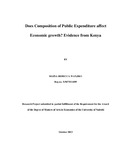| dc.description.abstract | This study sought to examine the impact of public expenditure on economic growth in Kenya between 1981 and 2011 with a view of establishing which specific components of government expenditure have significant impact on economic growth. Public expenditure was disintegrated into various components namely education, health, defense, public order and safety, public debt transactions, agriculture and transport and communication. The study employed co integration analysis and error correction methods to investigate the relationship.
The estimation results of the long-run model indicated that public expenditure on public debt transactions was positive and significant in determining growth while Post Election Violence had a significantly negative long run effect on the economy. The lag of GDP also has a positive and significant effect on GDP. However, expenditure on health, education, agriculture, defence, transport and communication and public order and safety are all insignificant determinants of long term GDP. The estimation results of the error-correction model indicated that lagged GDP and public spending on education has positive and significant impact on real GDP. Public spending on agriculture had negative and insignificant effect on real GDP which did not conform to the a priori expectations.
Given the positive and significant effect of public expenditure on education and public debt transactions the government should allocate additional funds to these in order to achieve its economic growth maximization objective. Political instability should be addressed since it has a negative effect on GDP while increased expenditure on defence, agriculture, transport and communication would guarantee food security, reduce the cost of doing business as well as create a favorable environment for investment. The government should also ensure resources are properly managed by promoting efficiency, fighting corruption and embezzlement in the public sector. | en |

